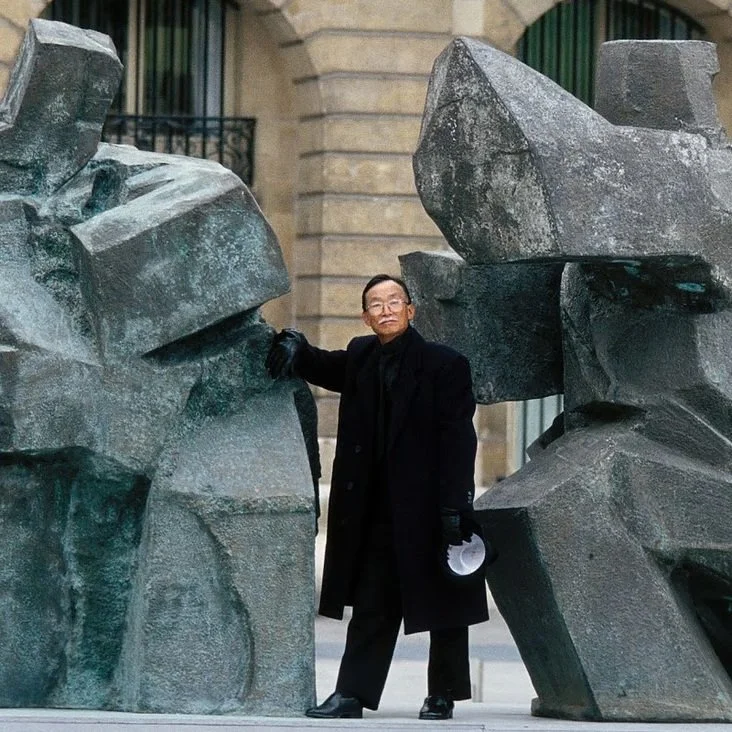Hong Kong Drama Series at Centre of Controversy Triggers Need for Greater Dialogue.
Canadian Actress Franchesca Wong’s Complex Duo Role Draws Criticism.
Barrack O'Karma 1968 poster
Barrack O'Karma 1968, Poster of Chapter 7, “Jie jie“.
Sequel Barrack O’Karma 1968 admittedly suffers from its poorly named English title (discussed earlier on our platform), but like the original series, its storyline, production and acting culminate in one of the most imaginative and meaningful dramas from TVB in recent years. Two wrongs never make a right, and sadly, the comments in reaction to the issue clearly demonstrate that a good amount of hate being thrown at the actress, the production company and drama at large, are mainly by people who have not even watched the drama and episodes under contention — the comments actually contradict the content and narrative behind the story. Perhaps it is worth a in-depth discussion on many fronts, to cast light on the significance on the drama’s lessons and commentary on society, and to confront the matter firsthand at the centre of the controversy: that a Chinese actor darkened her skin for half of her performance to portray a Filipina domestic helper in the story.
Let’s be frank. In 2022, it is widely considered incorrect to darken skin tones with make-up to portray another ethnicity, because it is a form of racism that is especially damaging when it is the ethnicity of a marginalised group. It defies the notion of the need for representation of marginalised or under-represented people in film and television, such as Asian representation in Hollywood. In the case of Barrack O’Karma 1968, what commentators are calling out is the desire for representation of Filipinos in roles portraying their own ethnicity in Asia — it is considered insensitive and inappropriate to cast a Chinese actor to portray a Filipino role, just as it was inappropriate to have a white actor portray an Asian character (such as the disapproval of Scarlett Johanssen being cast as an Asian character in Ghost in Shell). Drawing parallel criticism when it comes to physical portrayals of a marginalized group (though not to do with ethnicity) is Renee Zellweger, who recently stars as a murderer in an NBC drama wearing a fat suit to portray a physically larger character, which was deemed “damaging, fatphobic and potetially triggering,” by UK’s Metro. Representation is important in today’s society which is one that is diverse and complex. Canadian TV host Tracy Moore recently discussed this on her social media about how many plus sized actors are waiting for the opportunity to be casted, and there is no shortage of talent, so why was Zellweger chosen for the role? Perhaps it would have been a better choice to cast someone who already had the physical attributes of the role, even if not all things were equal. It does bring up an infinite number of questions of casting and portrayal of others that we will have to explore further.
Coming back to the issue in focus for Barrack O’Karma 1968, there are several questions that are not easy to answer but beg to be asked: What happens when the character is required to be one ethnicity in the first part of the story but she transforms into another in the second half? (This is a fictitious and supernatural drama about parallel universes and the butterfly effect). Is it the marginalisation that makes it “wrong” to darken one’s skin to portray a character, or are all instances of darkening of skin to portray another ethnicity offensive? Would it be more “right” if a Filipina actor was casted for the role of Louisa, and then pale make-up applied when her role turned into the Chinese character? Would that cause even greater controversy of stereotypes and add another unwanted narrative about changing a marginalised person’s skin colour to gain a change in power? Or would it be more accepted if there was a bi-racial actor who had both Filipino and Chinese backgrounds taking on a role that transforms between both?
Franchesca Wong’s APOLOGY on social media
In speaking with other actors of Barrack O’Karma 1968 —who have had to transform their looks and bend their acting in all sorts of ways to portray parallel universes, personalities lost in time and space, varying degrees of privilege, poverty and illnesses, act a character with injury or disability— the line is not so clear and in fact a very grey area, but everyone agrees that dialogue and learning through these experiences is helpful in creating progress. Acting is about delivering a convincing performance that touches people, and it often requires physical changes paired with the heart and talent that comes to life in every role. “Many times Chinese actors are used to portray a Korean person or I might have to learn an English accent to portray a British-educated Hong Konger, or any actor might have to change their look using make-up, hair and wardrobe to resemble a person from the past, “ shares one actor who is worried about the impact of hate that was thrown at fellow actor Francesca Wong who has endured the brunt of the controversy in her debut performance in a television drama.
Where hate is at work, understanding goes much further. What might be worth a valuable conversation surrounds the intent. What was the intention of the writer and producer behind the short story that required the actor to deliver a performance that transforms between 2 characters (Louisa, a Filipina domestic helper and Lulu, the Chinese daughter of the local couple she works for)?
In the short story, there are actually multiple moments that shed light on the struggle and plight of domestic workers, confront many stereotypes and in fact, appeals for compassion and equal treatment of this marginalised group. For example: a local Chinese woman in the elevator defends Louisa from a rude local; the mother in the family hushes her friends who judge Louisa for being a potential gold digger by saying that kindness is important; the mother leaves a wine store when they don’t serve Louisa wine because she is a helper; and Lulu’s husband tries to save Louisa from the wrath of the family’s plans that have already mentally damaged former hires. All these instances on screen were respectful in tone and delivery, and is consistent with the flavour of the other short stories in the drama which make viewers think twice about stereotypes or contentious topics. CNN recently wrote on this topic too and shared that, “while ethnic minorities account for just 4% of Hong Kong's population, the city is home to an estimated 200,000 Filipino domestic workers, many of whom face discrimination, poor working conditions and significant challenges gaining residency rights.” For viewers who praised the drama and delivery of the role of Louisa, these issues of discrimination and working conditions were earnestly brought to light in the drama. Many of the hateful comments about this controversy mention that associating the Filipina domestic worker with voodoo reinforces stereotypes, but if you follow the story arc, she is actually not associated with it — it is clear that she is being misunderstood by the family for practicing voodoo because of sleepwalking and a box that contains remnants of a miscarriage that she hugs when missing her lost child. What the story actually illustrates is the opposite of assumptions, and challenges people to think twice: oftentimes, these foreign workers are misunderstood and stereotypes stack up against them, but they are working so hard, sacrificing so much to earn a living to send back to their home country. This was actually the message behind the story. From the serious tone of delivery, the writer and producer did take creative risks to present a story that would challenge stereotypes by bringing them to light and challenge people to think about the issues from several new perspectives. Unfortunately, the content may have been uncomfortable for some audiences and for the people the story was attempting to speak up for, and has become a learning experience.
Who is Franchesca Wong and what did she do to prepare for this duo role as Louisa and Lulu?
Franchesca is a Canadian actress who was born in Calgary and graduated from the University of Calgary with a Bachelor of Commerce in 2012. She quit her job to find her passion, moved to Hong Kong to follow her heart for drama, and graduated from the Hong Kong Academy for Performing Arts with a Bachelor of Fine Arts (Honours) Degree in Drama, with a major in Acting in 2019. She entered the industry only three years ago with a focus in theatre. This role in Barrack O’Karma marks her debut in television dramas. Tackling this first-time experience, Franchesca spent months learning from her domestic helper. Being only fluent in English, Cantonese and Mandarin, Franchesca was tasked to study and learn Tagalog for her role, and put in time to do research by attending events and activities with her domestic helper in real life. Her desire was to deliver the first half of her role as Louisa in a way that would be convincing and to the audience. Ultimately, her performance would help to express the heartaches and struggle that her character went through, which represents the broader reality and sacrifice for many domestic workers. As a fresh face to dramas, for many viewers, they may not have realised at first that Louisa’s character was played by a Chinese actress until she slowly transformed into the Chinese (replacement) daughter for the couple in the story. Short of the controversy, it was a highly praised performance. However, upon going through this experience, she has learned a great deal about the greater conversation globally on racism and portrayal of ethnicity. She also approached the situation with genuine sincerity and has taken the opportunity to reflect on it using her voice in a respectful manner, to take responsibility for her part in the role and what she could have done more in her position and job. Her honesty and apology to anyone impacted by this issue is something that opens up the discussion for others who can benefit from her experience.
Where does this leave us? We would like to hear from you on the questions posed above. What did you think if you watched the episodes in discussion? How could this role have been better executed to avoid controversy and racism? What would you do if you were casted for a position that required you to portray another ethnicity in a part of your role? What contrustructive feedback can the producer learn from for future stories? Should dramas and producers even attempt to confront stereotypes and controversial issues, and if they do, how can they better know where to draw the line? It’s time for deeper conversations, to not only shout and react when mistakes happen, but to have dialogue on how to do better across all mediums of storytelling, casting, and creative production.










The Vancouver Silent Auction site is now live! Explore various categories showcasing generous donations from our valued donors. Engage in bidding for your favourite items, supporting a great cause, and discovering an array of distinctive goods and exclusive experiences, ranging from home decor to fashionable apparel and accessories